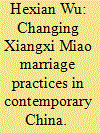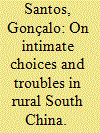| Srl | Item |
| 1 |
ID:
117934


|
|
|
|
|
| Publication |
2013.
|
| Summary/Abstract |
This essay describes elements of Xiangxi Miao marriage practices such as courtship, wedding ceremonies, and marriages between the Miao and Han, exploring how Xiangxi Miao marriage practices changed at the turn of this century, and disclosing social influences on the changes in marriage practices. The author uses a Miao village of Zalun as a case study. Through participant observation and intensive interviews, it was found that, before 2000, Xiangxi Miaos' courtship practices and wedding ceremonies had strict processes and reflected agricultural rhythm. In addition, there were few marriages between the Miao and Han. Since the beginning of this century, Xiangxi Miao marriage practices have changed due to socioeconomic development, population mobility, and diverse communication between Miao young women and men. Dramatic shifts in marriage practices have produced social influences among Xiangxi Miao communities. The changes in marriage practices have promoted Xiangxi Miao free marriages, advancing social cohesion and acculturation. However, these changes have also increased numbers of criminals and problems of healthy growth and education of the stay-at-home children.
|
|
|
|
|
|
|
|
|
|
|
|
|
|
|
|
| 2 |
ID:
146081


|
|
|
|
|
| Summary/Abstract |
This article explores how marriage practices and intimate relations are being refashioned in reform-era China in the context of increasingly entangled intersections between private negotiations and public dialogues in law, state policy, science, and the media. Based on long-term field research in impoverished rural areas, the article focuses on the intersections between intimate practices of the everyday and large-scale projects of social engineering aimed at turning ordinary ‘peasants’ into ‘modern civilized citizens’. The article draws particular attention to the important role played by the Birth Planning Policy in shaping local reproductive practices and intimate structures, but the approach developed here to make sense of the impact of globalized neo-Malthusian state interventions on local realities considers also the perspective and the agency of ordinary individuals and communities. Instead of assuming that changes in local practices follow primarily from the impact of external forces such as state policies and technologies of birth planning, the article suggests that local practices and global forces co-produce each other through ‘frictions’ of various kinds. This focus on the micro-macro intersections of what I call here the ‘techno-politics of intimacy’ joins recent efforts in the humanities and social sciences to move beyond conventional top-down approaches to global intimate transformations.
|
|
|
|
|
|
|
|
|
|
|
|
|
|
|
|